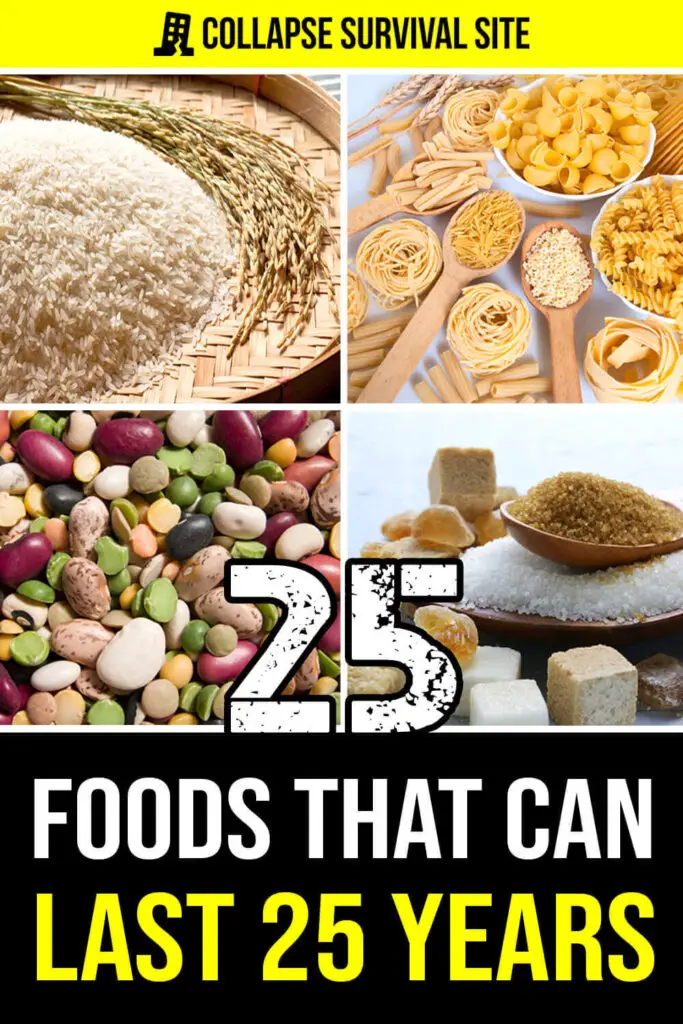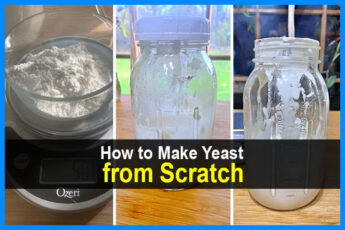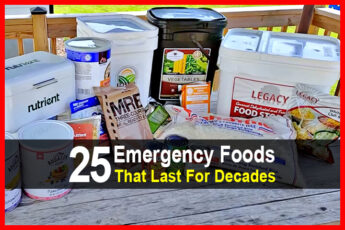Estimated reading time: 8 minutes
No one has money to burn or waste these days. That’s why you want to be smart about the money you spend buying food you are going to put onto the shelf to store for a time that’s harder than what we’re already dealing with. It can always get worse.
The following list of foods will last forever, which means you aren’t going to be throwing anything out and wasting your hard-earned money.
It’s important to note that food storage isn’t an exact science. The best you can do is store everything in a cool, dry place. A spare room that has AC for summer days is an option. A basement is perfect. A root cellar is also an option if you can guarantee it won’t get flooded.
Want to save this post for later? Click Here to Pin It On Pinterest!
1. Honey
Honey can last indefinitely if stored properly. Honey is a huge wallop of calories and energy, which is crucial in a survival situation. A little spoonful goes a long way. And honey is an amazing anti-bacterial and can heal internal problems as well as wounds.
Glass jars, sealed and stored in a cool, dry place are the best way to store honey. If you get it in a large bucket, divide it into smaller jars to avoid air exposure when you need to use some.
2. Salt
Salt is a natural preservative and can last indefinitely. It's been used for centuries to preserve other foods like meats and fish. Salt also provides necessary electrolytes that keep your muscles healthy.
Store salt in airtight containers. Glass or plastic is fine just make sure it’s a tight seal. It doesn’t hurt to add an oxygen absorber to the container. As usual, store in a room temperature place away from sunlight.
3. Sugar
Sugar can last indefinitely when properly stored. Sugar makes life sweeter. You can use it to preserve fruit. Sugar can get invaded by weevils. If you buy sugar in bulk, take it out of the paper bag and put it in airtight containers.
Add in a couple of bay leaves to deter pests. Sugar has to be kept dry. If humidity is an issue, have a dehumidifier in your storage area.
4. Rice
White rice, when stored in a cool, dry place, can last for 20-30 years or even longer. Brown rice has a shorter shelf life due to its higher oil content. Brown rice can and will go rancid after a year or two.
Adding an oxygen absorber and bay leaves to the rice helps keep bugs at bay. Ideally, storing rice in vacuum-sealed mylar bags is your best option. For more protection, put the bags in a five-gallon bucket.
5. Dried beans
Beans and legumes, such as lentils and chickpeas, can last for several years if kept in airtight containers and stored in a cool, dark place. Because a small amount of beans goes a long way, it’s better to divide bulk bags of beans into small containers. Again, mylar bags are excellent for storing beans.
6. Pasta
Dried pasta, when stored properly, can have a long shelf life. Pasta is so versatile, filling and inexpensive it’s just common sense to store it.
Because it is a flour product, popping your pasta into the freezer for a couple of weeks before storing it can kill the weevil eggs. Storing in mason jars and keeping in a cool, dry place is ideal.
7. Powdered milk
Powdered milk can last for several years when stored in a sealed container in a cool, dry place. Powdered milk is good for thickening soups and stews as well as using as intended as a glass of milk. It is a common baking ingredient as well.
8. Canned foods
Canned goods, such as vegetables, fruits, and meats, often have long shelf lives even if the expiration date says otherwise. Cans are fickle beasts.
The key is to use common sense. A can that is dented, leaking or bulging is an absolute no. Don’t even bother opening it. Canned goods should be kept in the same dry, dark storage as the rest of your stored food.
9. Hardtack
This is a type of hard biscuit or cracker that you can make at home with flour and water. It can last for decades if kept dry. It’s not the tastiest meal you’ll ever eat, but it will last forever. It’s best if you let it soak in soup or stew to soften it. Storing it in vacuum sealed pouches is ideal.
10. Dehydrated or freeze-dried foods
Many commercially packaged dehydrated or freeze-dried foods, like fruits, vegetables, and meat, have extended shelf lives, often ranging from 10-30 years or more. If you want to dehydrate your own, it’s absolutely critical you get the food dry.
If it isn’t dry, it will mold. You can invest in a machine for freeze-drying your own fruits and veggies. It’s expensive but if you have access to plentiful produce, it could be worth it. Storing it in small, airtight containers is best.
11. Corn syrup
Another sweetener on your shelf is a good thing. It will store forever when kept out of direct sunlight. It can be used in recipes as well as in food preservation.
12. Maple syrup
Pure maple syrup will last forever. It’s more expensive than the thinner stuff you’ll buy at the grocery store. If it gets hard, a little heat will melt it and make it easily spread over your pancakes. Something as simple as maple syrup can not only provide a burst of sugar but a little taste of home.
13. Liquor
Liquor like rum, vodka and whiskey may not be your thing, but it’s somebody’s thing. If you don’t want to drink it, store it to use in cooking or as an anesthetic. It’s going to be a prime bargaining tool.
14. Bouillon
Cubes or powder are a must on any prepper shelf. It will make plain water into something to fill the belly and satisfy the hunger. It flavors beans, rice, soups and so on. A little bouillon goes a long way and it is very cheap.
15. Instant coffee
While it’s great for obvious reasons, instant coffee can also be used as flavoring for some cakes and other desserts. Buy the smaller containers or if you buy bulk, divide into smaller jars. The less air exposure, the longer it will last.
16. Gelatin
Gelatin isn’t just for Jell-o, but even if that’s what you use it for, it’s a nice comfort food. The kids will love it. Illness is bound to happen and having things like broth and Jell-o is going to be good for an icky tummy.
17. Pure vanilla extract
Pure vanilla extract is not the same as the cheaper grocery store options. The pure stuff is more expensive and will last forever when stored in a cool, dry place.
18. Soy sauce
It’s not exactly a food, but it’s nice to dump a little soy sauce over plain rice. Just be careful because the sodium content is a risk in a survival situation. Your body needs salt, but not too much.
19. Wheat berries
Wheat berries are raw and unprocessed. You can grind them into wheat flour or serve them with some milk to eat as a cereal. Store small quantities in mylar bags or sealed jars.
20. Baking soda
Baking soda is a prepper favorite. It is extremely versatile and cheap. Baking soda is a leavening agent necessary in baking. It’s a household cleaner as well as toothpaste, shampoo and on. It’s not hard to store. Just keep it out of the sunlight and it needs to stay dry.
21. Unsweetened cocoa powder
Cocoa powder will last forever when kept out of the sun and is kept cool and dry. It’s not necessarily a necessity but it’s nice to have a little chocolate on hand to provide some creature comfort.
22. Ghee
Ghee is a butter substitute that unlike butter, does not need to be kept in the fridge. You can make your own ghee or buy high-quality ghee at a specialized market. Store in clean jars that are sealed tight. It needs to be kept at room temperature or cooler.
23. Dried corn
Dried corn can be rehydrated and added to stews and soups. It can be ground into cornmeal. Store in smaller portions in an airtight container.
24. Cornmeal
Cornmeal is another baking staple. It can be used to bread fresh fish you catch or made into cornbread. Storing it in jars or mylar bags with oxygen absorbers will extend the shelf life long past the typical two years.
25. Distilled white vinegar
Vinegar is an important pickling tool. It can also be used to make sauces, dressings and brines for all the meat you are going to harvest from the wild. It’s an easy one to store and doesn’t require anything special.
As with anything, you have to use your best judgement. Even if you take every precaution to properly store your food, there is always a chance of spoilage. This is why it makes more sense to divide your bulk goods into smaller portions. You won’t have to worry about losing a huge stockpile.
Like this post? Don't Forget to Pin It On Pinterest!









